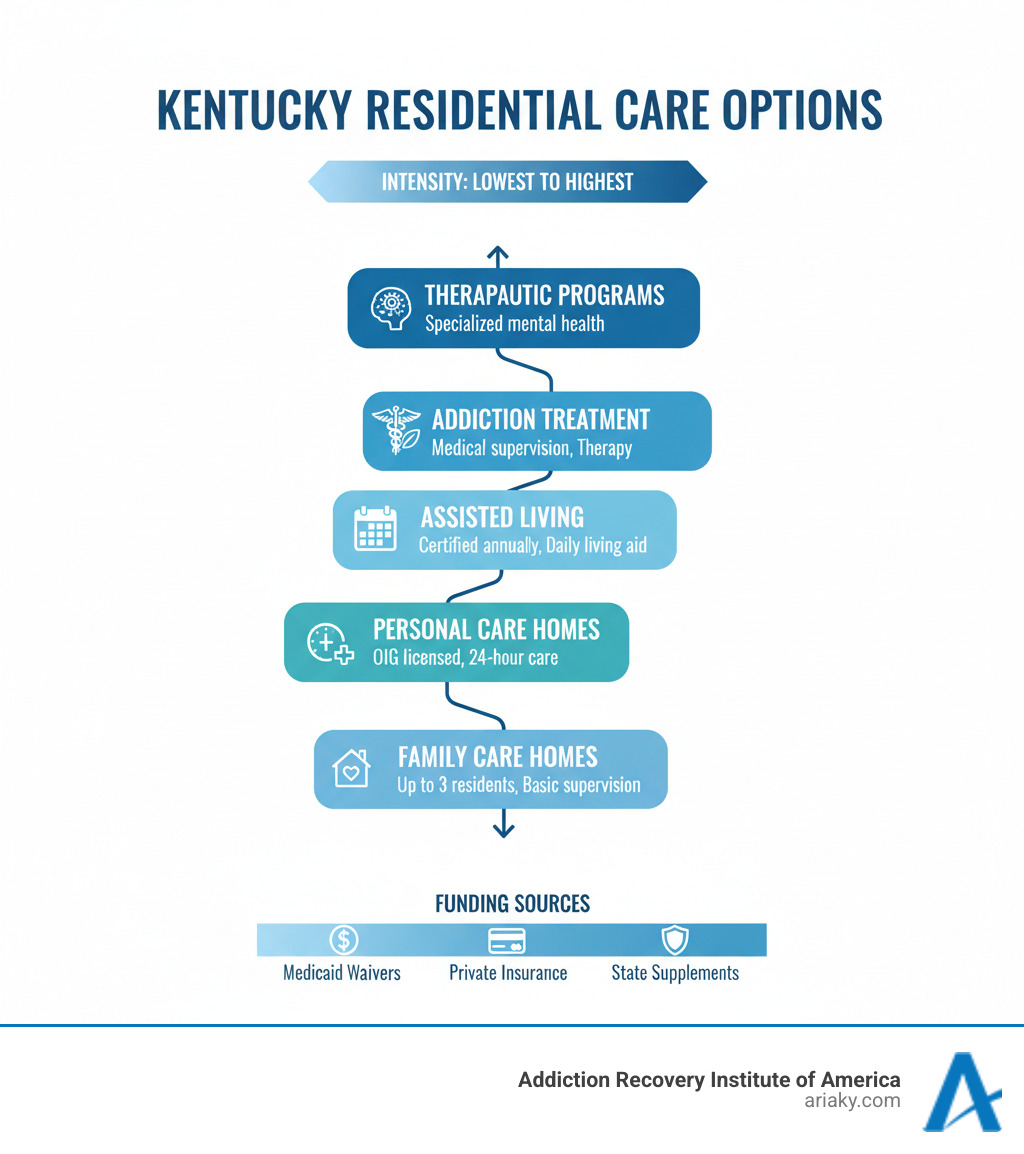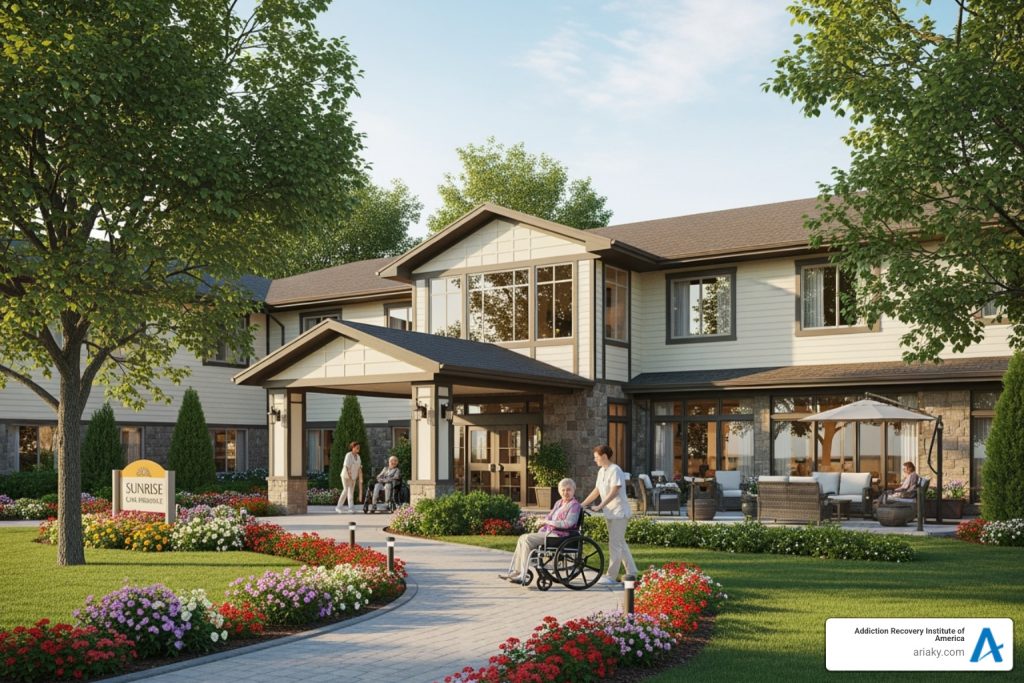Why Kentucky Residents Need Clear Guidance on Residential Care Options
Finding the right residential care Kentucky can feel overwhelming, but the state offers a wide spectrum of options for addiction recovery and long-term care.
Quick Guide to Kentucky Residential Care Options:
- Personal Care Homes: Licensed facilities with 24-hour supervision and basic health services.
- Addiction Treatment Centers: Specialized residential programs for substance abuse recovery.
- Assisted Living Communities: Certified facilities offering assistance with daily living activities.
- Family Care Homes: Small, home-like settings for up to three individuals.
- Therapeutic Residential Programs: Specialized facilities for mental and behavioral health.
Kentucky’s Cabinet for Health Services and Office of Inspector General enforce strict licensing, ensuring quality care. Facilities offer various levels of support, from basic supervision to intensive medical services.
Funding options include Medicaid Waivers, the Optional State Supplement (OSS), and private insurance. As one provider notes, “Your journey in recovery starts here!” The right residential care can be the foundation for lasting recovery. Understanding Kentucky’s landscape is the first step to making an informed decision.

Understanding the Types of Residential Care in Kentucky
Finding the right residential care Kentucky option means understanding the different types of facilities available. Residential care is an umbrella term for any setting where people live full-time while receiving support, from seniors needing daily assistance to individuals battling addiction.
- Personal Care Homes (PCHs): These licensed facilities provide 24/7 supervision and basic health services. With about 100 across the state, they serve residents who need help with daily living but don’t require intensive medical care.
- Assisted Living Communities (ALCs): Certified annually, ALCs help residents maintain independence while providing support when needed. They are for individuals who can manage most daily tasks but benefit from a supportive environment.
- Family Care Homes: These small, homelike settings provide 24-hour care for up to three residents, offering a more personal, less institutional feel.
- Child Caring Facilities: These therapeutic residential programs offer structured environments and intensive support for adolescents (ages 12-18) facing trauma or significant behavioral issues.
- Addiction Treatment Centers: These specialized facilities focus exclusively on recovery from substance use disorders, combining medical supervision with therapeutic interventions in a safe, healing environment.
You can explore more about Kentucky’s long-term care options through the Long-Term Care Facilities page, or learn about addiction-specific options in our Rehab Centers in Kentucky guide.
Personal Care Homes vs. Assisted Living Communities
While both PCHs and ALCs offer residential support, they differ significantly in regulation and services.
The main difference is oversight. Personal Care Homes are licensed by Kentucky’s Office of Inspector General under the same framework as medical facilities, requiring stricter staffing and care protocols. In contrast, Assisted Living Communities are certified by the Department for Aging and Independent Living, with a focus on safety and quality of life rather than medical care.
Regarding services, PCHs provide continuous supervision and direct personal care, including help with bathing, dressing, and managing health conditions. ALCs focus on independence and assistance, offering medication reminders and help with daily activities but not direct healthcare. If a person needs hands-on help to shower, a PCH is appropriate. If they can shower alone but need someone nearby for safety, an ALC may be a better fit.
Specialized Facilities for Addiction and Mental Health
Residential treatment for addiction or mental health offers a therapeutic environment focused on recovery. These centers provide a crucial break from the triggers and stresses of daily life.
Key components of specialized addiction facilities include:
- 24-hour supervision in a safe, trigger-free setting.
- Medical supervision, which is critical during detox and for managing co-occurring mental health conditions like depression or anxiety (dual diagnosis).
- Therapeutic interventions, such as individual, group, and family counseling, form the core of treatment.
- Life skills training and relapse prevention to prepare residents for a successful return to their communities.
The goal extends beyond stopping substance use to rebuilding lives and developing tools for long-term recovery. For more details, our guides on Inpatient vs Outpatient and Drug Detox Kentucky explain the full spectrum of care. Explore therapeutic approaches in our Addiction Therapy Kentucky resources.
Core Services and Specialized Programs Offered
Residential care Kentucky facilities offer more than just a place to stay; they provide comprehensive support systems for recovery and healing.
Core services across most facilities include:
- 24-hour supervision for safety and immediate assistance.
- Personal care assistance with daily activities like bathing, dressing, and eating.
- Medication management to ensure proper dosing and compliance.
- Meal services providing nutritious meals, often accommodating special dietary needs.
- Social and recreational activities to combat isolation and build community.

For addiction treatment, the therapeutic component is critical. Our Addiction Therapy Kentucky resource explores various evidence-based approaches.
Therapeutic and Clinical Services
The heart of specialized residential care lies in its clinical services, delivered by multi-disciplinary teams.
- Individual therapy provides a private space to work with a licensed therapist using approaches like Cognitive Behavioral Therapy (CBT), Dialectical Behavior Therapy (DBT), or Eye Movement Desensitization and Reprocessing (EMDR).
- Group counseling creates a supportive peer community to share experiences and practice new skills in areas like relapse prevention and anger management.
- Family therapy recognizes that addiction affects the entire family. Many programs involve family members in the healing process, as their support is crucial for long-term success.
- Trauma-informed care is vital, as many residents have histories of trauma. Therapists use specialized approaches like Trauma-Focused CBT (TF-CBT) to address these underlying issues.
- Dual-diagnosis treatment addresses co-occurring mental health and substance use disorders simultaneously, which is far more effective than treating them separately.
For more mental health resources, explore what’s available through the Southeast MHTTC Kentucky resources.
Holistic and Support Services
Recovery involves rebuilding a whole life. Holistic services equip residents with practical skills and confidence for long-term success.
- Life skills training covers budgeting, cooking, time management, and job interview skills.
- Educational and occupational support helps residents continue their education or prepare for employment through workshops and vocational training.
- Spiritual development is offered in many facilities, providing opportunities for reflection and growth, regardless of whether the setting is faith-based or secular.
- Recreational activities, including physical fitness, art therapy, and adventure programs, are essential for well-being and show that recovery can be enjoyable.
These services work together to rebuild self-esteem and prepare residents for a successful transition back to their community. Our Alcohol Rehab Kentucky guide shows how these supports contribute to lasting recovery.
Navigating Licensing, Costs, and Admissions for residential care Kentucky
Finding the right residential care Kentucky facility requires understanding state regulations, financial planning, and the admissions process. Our Kentucky Addiction Treatment Guide offers additional support for these important decisions.
Kentucky’s Licensing and Regulatory Requirements
Kentucky has a strong framework to protect residents and ensure high standards of care. The Kentucky Cabinet for Health and Family Services provides oversight, with two key departments handling enforcement. The Office of the Inspector General licenses and inspects long-term care facilities like Personal Care Homes, while the Department for Aging and Independent Living certifies Assisted Living Communities.
Regulations are strict, covering:
- Staffing requirements: Personal Care Homes must have an attendant awake and on duty on each floor at all times.
- Background checks: Mandatory for all employees to ensure resident safety.
- Annual inspections: Unannounced visits to check everything from medication storage to fire safety.
Specific rules can be found in the Kentucky Administrative Regulations, such as 902 KAR 20:036 for Personal Care Homes.
The Cost of residential care Kentucky and Payment Options
While residential care Kentucky can be costly, several payment options can make it manageable.
- Private Pay: Using personal savings, retirement funds, or other private assets.
- Health Insurance: Most private plans cover a portion of residential treatment for addiction or mental health. Always verify coverage with your provider beforehand. Our Paying for Treatment page can help guide you.
- Medicaid Waivers: Programs like the Supports for Community Living Waiver and the Michelle P. Waiver help individuals with intellectual or developmental disabilities access residential services.
- Optional State Supplement (OSS): This state program can help SSI recipients cover costs at Personal Care Homes and Family Care Homes.
Assisted Living Communities are typically private pay and do not accept public funding.
The Admission Process from Start to Finish
The admission process is designed to ensure a facility is the right fit for your needs.
- Initial Inquiry: A phone call to discuss your situation and learn about the facility’s programs.
- Clinical Assessment: A detailed evaluation by a qualified professional to understand your mental, physical, and emotional health, including substance use history.
- Medical Evaluation: A review to ensure the facility can safely meet your medical needs.
- Insurance Verification: The facility’s financial team works with your insurance provider to confirm benefits and out-of-pocket costs.
- Individualized Care Planning: Upon admission, the treatment team creates a personalized care plan based on your specific goals and needs. This plan is reviewed and adjusted regularly.
Our Louisville Drug Rehab: Complete Guide provides more insight into what this process looks like in practice.
Making the Right Choice: A Step-by-Step Guide
Choosing the right residential care Kentucky facility is a critical decision. By starting with a clear understanding of your needs and conducting thorough research, you can find a place that feels right. For regional insights, our Bowling Green Drug Rehab guide can be helpful.
Before you begin your search, identify the level of care required. Is it 24/7 medical supervision, assistance with daily tasks, or specialized addiction therapy? A clear list of needs will help focus your research on appropriate facilities.

How to Evaluate a Facility
Evaluating a facility goes beyond its website or brochure.
- Verify Licensing: Ensure the facility is properly licensed or certified by the appropriate Kentucky state agency. Reputable facilities will readily provide this information.
- Read Reviews: Look for patterns in online reviews rather than focusing on isolated comments. Consistent feedback, positive or negative, is noteworthy.
- Visit in Person: A personal visit is essential. Observe the cleanliness, atmosphere, and how staff interact with residents. Trust your gut feeling about the environment.
- Ask Key Questions: During your tour, inquire about staff-to-resident ratios (especially on nights and weekends), emergency procedures, staff qualifications, and what’s included in the monthly fee.
- Understand the Philosophy: For addiction treatment, ask about their treatment philosophy. Do they offer evidence-based therapies and view addiction with compassion? Understanding the Benefits of an Alcohol Rehab Center can help you evaluate their approach.
Family Involvement and Aftercare Planning
Quality residential care recognizes that healing often involves family and requires a plan for life after treatment.
- Family Involvement: The best facilities see family as partners in recovery. They offer family therapy sessions to improve communication and heal relationships. They should also have clear communication policies for updates and visits.
- Aftercare Planning: Discharge planning should begin early in the treatment process. A good plan connects the individual with ongoing support, which may include:
- Sober living arrangements
- Outpatient therapy and support groups (e.g., AA/NA)
- Medication management assistance
- Follow-up appointments
- Alumni programs to stay connected to the recovery community
The journey doesn’t end at discharge. A strong aftercare plan is crucial for long-term success. Our Kentucky Partial Hospitalization guide explains options that can bridge the gap between residential care and full independence.
Frequently Asked Questions about Kentucky Residential Care
Navigating residential care Kentucky brings up many questions. Here are answers to some of the most common concerns.
What is the main difference between a Personal Care Home and an Assisted Living Community in Kentucky?
The key differences are in licensing, level of care, and funding.
- Licensing: Personal Care Homes (PCHs) are licensed as long-term care facilities by the Office of Inspector General. Assisted Living Communities (ALCs) are certified by the Department for Aging and Independent Living.
- Level of Care: PCHs provide 24/7 supervision and hands-on personal care (e.g., bathing, dressing). ALCs focus on independence, offering assistance with daily activities but not direct healthcare.
- Funding: PCHs may be partially covered by the state’s Optional State Supplement (OSS) for SSI recipients. ALCs are private-pay businesses.
For official details, see the regulations for PCHs in 902 KAR 20:036 Operation and services.
Can I use Medicaid to pay for residential care in Kentucky?
The answer depends on the type of care and your eligibility.
- Assisted Living: Generally, no. Standard Medicaid does not cover ALCs, which require private payment or long-term care insurance.
- Personal/Family Care Homes: While not covered by regular Medicaid, the Optional State Supplement (OSS) can help eligible SSI recipients with costs.
- Medicaid Waivers: Specialized programs like the Supports for Community Living (SCL) Waiver and the Michelle P. Waiver can fund residential services for individuals with intellectual and developmental disabilities.
Always check directly with Kentucky Medicaid to confirm eligibility for any waiver program.
How long is a typical stay in a residential treatment center for addiction?
The length of stay in residential care Kentucky for addiction is custom to individual needs. There is no one-size-fits-all timeframe.
- Short-term programs typically last 28 to 90 days. They focus on stabilization, intensive therapy, and developing coping strategies.
- Long-term programs can extend from 6 to 12 months or more. These are beneficial for individuals with complex addictions or a history of relapse.
A quality treatment team will regularly assess your progress to determine the appropriate length of stay, ensuring you have the time and support needed for lasting recovery.
Conclusion
Finding the right residential care Kentucky option doesn’t have to feel overwhelming when you have clear, reliable information to guide your decisions. Throughout this guide, we’ve walked through the diverse landscape of care options available across the Bluegrass State, from Personal Care Homes that provide continuous supervision for those needing hands-on daily assistance, to Assisted Living Communities that promote independence while offering supportive services.
We’ve also explored the specialized world of addiction and mental health residential facilities, where therapeutic environments focus on healing and recovery rather than just basic care needs. These centers recognize that addiction is a complex brain disorder requiring comprehensive, evidence-based treatment approaches.
The regulatory framework in Kentucky ensures quality and safety through strict licensing requirements overseen by the Cabinet for Health Services and Office of Inspector General. Understanding these standards helps you make informed choices about facilities that meet your loved one’s specific needs.
When it comes to financial planning, Kentucky offers various pathways including private pay options, health insurance coverage, Medicaid Waivers for eligible populations, and the Optional State Supplement (OSS) for qualifying SSI recipients. While Assisted Living Communities typically require private funding, specialized programs for developmental disabilities may qualify for waiver services.
The admission process itself follows a thoughtful progression from initial inquiry through clinical assessment, medical evaluation, and individualized care planning. This structured approach ensures the right fit between resident needs and facility capabilities.
Most importantly, we’ve emphasized that family involvement and aftercare planning aren’t afterthoughts – they’re essential components of successful treatment outcomes. Whether through family therapy sessions, ongoing communication, or comprehensive discharge planning that includes sober living arrangements and continued support, the journey extends well beyond the residential stay itself.
At ARIA Kentucky, we understand that choosing residential care represents hope for recovery and a better future. As an accredited, AODE-certified addiction treatment center, we provide individualized care through our full continuum of services, including medical detox, residential treatment, Partial Hospitalization Programs, and Intensive Outpatient Programs. Our approach recognizes that lasting sobriety requires personalized treatment that addresses each person’s unique circumstances and goals.
If you or a loved one is ready to take that crucial first step toward healing, we encourage you to explore our comprehensive Kentucky drug and alcohol rehab programs to find the support and specialized care that can make all the difference in your recovery journey.


